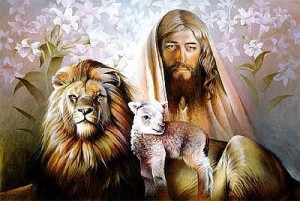The Lamb of God is a title of Christ we use several times in each Sunday liturgy. But to the general public, it is definitely more obscure than the titles of “Saviour” or “Messiah”. Even in the days of John the Baptist it was by no means a common name for the Messiah. We find that it is mainly used by John the evangelist, and a few times by Luke and Peter and in the book of Revelation.
Now imagine you had come to John the Baptist to find peace for your soul and to listen to his teachings. And John would then point to someone in the crowd and call Him the Lamb of God and the Messiah at the same time. Although some of the people, particularly the Pharisees and Sadducees, should have had some idea of what John was talking about, from their knowledge of the writings of the prophets, this combination of titles would still be intriguing. John himself would later have his doubts. Being thrown in prison he would wonder if perhaps Jesus was not a little too much of a lamb and too little of a Messiah.
But in our gospel reading he freely speaks what the spirit of God has shown to him, and his words are a prophecy if ever there was one. When John repeats it the next day, it is no surprise that two people start to follow Jesus. One of them is Andrew, and the other is not mentioned, but is probably John himself. They are not yet disciples, but they are curious and recognize in Him another fascinating teacher.
Note that Jesus first wants to know, “what are you looking for?” This is a question we have learnt not to ask when someone shows interest in the church or the bible. It is usually considered too invasive and confronting, possible scaring people away. Should we not welcome everybody, regardless of their motives, into our communities? Without suggesting that we should always start with questions that make people feel uncomfortable, I think this question from Jesus may still be valuable both for novices in the faith and for veterans. What are you, what am I really looking for?
We may have several reasons to be Christians, but one of them should be the desire to learn from our Lord. As it says in Psalm 40:6, “Sacrifice and offering you do not desire, but you have given me an open ear.” This, by the way, is another prophecy about the Messiah, but it shows what is important in the eyes of God, and in that sense it applies to us as well.
Christ’s first followers do not seem to answer the question, but they reply by asking another one. “Rabbi, where are you staying?” For Christ this is enough to know that they are seeking true knowledge and wisdom. Indirectly, they have expressed their wish to be in a sheltered place where they can have a long and deep conversation. Jesus does not mind that they have sort of invited themselves, and says, “Come and see”.
It is this kind of boldness that Jesus actually likes. These were the first steps on the road of discipleship. About a year later they would be called disciples and later again, apostles.
With the change of name of the followers, also came a change of title for their master.
At first they would call him rabbi, teacher, later they would call Him Lord and Saviour. They were to learn that it was not knowledge that would save them, but Jesus Christ himself.
Yet it all started with curiosity, and maybe we sometimes tend to forget that stage or aspect. Not all things connected to Christianity are a mystery, not all things are forbidden territory for the mind. Jesus wants to be our teacher, too, He wants people to teach and to be taught. This is one of the functions of sermons, of readings and even of the liturgy and church music.
One of the characteristics of Anglicanism is a balance between word, prayer and sacrament. It is impossible to say which one of these is the most important, neither should we want to. Although we may have reasons to feel attracted to a high church or to a low church liturgy, the need for a balance between word, prayer and sacrament will always be there. For being church is not only about remembering Christ or celebrating the beauty of holiness. If that were the case we would be dangerously close to the idolatry of worshiping the holiness of beauty instead. But Jesus said in Matthew 28, “…go therefore and make disciples of all nations … teaching them to observe all that I have commanded you.”
 Now let’s return to the subject of the Lamb of God. If we would ask a random person in the street which animal they would associate with God, they would probably come up with a strong animal, like a lion, the king of the animal world. C.S. Lewis in his Chronicles of Narnia also uses a lion, named Aslan, to represent both God and Jesus, This lion then sacrifices its own life to save Edmund. Other religions use other strong animals like the elephant to represent deities.
Now let’s return to the subject of the Lamb of God. If we would ask a random person in the street which animal they would associate with God, they would probably come up with a strong animal, like a lion, the king of the animal world. C.S. Lewis in his Chronicles of Narnia also uses a lion, named Aslan, to represent both God and Jesus, This lion then sacrifices its own life to save Edmund. Other religions use other strong animals like the elephant to represent deities.
The closest thing to a lamb is probably found in the Greek myth of Jason and the quest for the golden fleece. King Athamus and his second wife Io were about to sacrifice a boy, a son from Athamus’ first marriage. They were led to believe that this sacrifice would help to stop a famine. Then at the sacrificial altar, just before the murder, a wondrous ram with a golden fleece appears and takes the boy and his sister and carries them to safety. The son would later sacrifice the ram. The fleece of the ram seems to have held special redemptive power. It became an almost magical item worthy of a quest. This is only part of a complicated story, but the essence is the same as in the story of Abraham, where God provides a sacrifice so that a son is saved.
In the Old Testament God was known by thunder and lightning, fiery columns, etc.,
and considered to be a jealous God, who punished even the children and grandchildren of sinners, and instructed his people to kill the heathen. The new symbol of a lamb is not an attempt to make God, as it were, more strokable. For even in the Old Testament there is this precious and simple story of Abraham, who is kept from bringing a bloody human sacrifice, and who was taught that God himself provides. This was a clear prophetic reference to Christ.
Both stories, Greek and Hebrew, illustrate that bringing an earthly sacrifice is never a solution. At the same time our world continues to demand victims. And these victims are often the only thing that convinces at least some of us of the seriousness of a situation. Just as a small example, the other day we heard in the news how a girl had died from drinking too much energy drink. Then many people suddenly realized how unhealthy some of the products in our supermarkets really are.
On a much larger scale we find less and less solidarity with the jobless and the poor.
When laws and benefits are changed without thinking about the consequences for those who are already struggling to make ends meet, often the only thing that can turn the tide seems to be when things go horribly wrong. We tell ourselves that we live in a civilized world, but this cannot be true if we still rely on victims. If the wealth of the super-rich is maintained by denying healthcare, wholesome food, jobs and basic rights to millions of others, then we are still a primitive society.
To say that the Son of God was killed by the Jews, is both offensive and inaccurate. But to say that he was killed by mankind, is to make an important point. That mankind was capable of countless killings, and of killing even its creator and redeemer (and I think we would do it again if he lived in our time), is telling. This is the sin of the world that Jesus came to take away.
Notice it speaks of sin in the singular, not of sins in the plural. It is not that our individual sins do not matter, but there is something even more fundamentally wrong with us, which is deeply embedded in the system of our societies. So far it has caused all political parties and leaders, once they gain power, either to fall into the trap of corruption, or for other reasons to fail in any profound reform. And their subjects are usually not much better.
How then can Jesus, the Lamb of God, take away this overwhelming, pervasive sin?
Well, that has been and will be the subject of many sermons, and will probably largely remain a mystery during our earthly existence and a long time afterwards. But not everything in the Christian faith is mysterious. There at least two things that are certain.
1. First of all that it makes no sense to fight fire with fire. Jesus took the radical and costly step of overcoming hatred by love, and sin by purity. That very gentleness and purity is what the evil one cannot stand. It exposes everything that is not authentic, everything impure or untrue or unloving. Ultimately everything will be judged by the gospel, and so in the book of Revelation the Word of God is portrayed as a rider on a white horse. His eyes are like flames, his cloak is painted red with blood and from his mouth comes a sharp sword, a symbol of sharp discernment and judgement, which was used before by the prophet Isaiah. This has nothing to do with hatred, but with seeing and placing things in a clearer light.
People like Mandela and Etty Hillesum, who refused to give in to hatred, have a similar effect on our society. They are raising the standards of humanity. A week ago the Haarlem Daily newspaper wrote about Etty Hillesum, and the article was called “Battle against hatred”. It showed that if there is such a thing as Holy War, it starts in our own heart and it does not fight people with different ideas or lifestyles, but hatred itself, and everything that causes it to spread and stay.
2. The second certainty is that, He, who gave his life for us and for what he believed in,
becoming a victim like we are, only voluntarily, is surely the ultimate teacher when it comes to matters of the heart and of salvation. Would you not like to sit at His feet and hear him explain the things that really matter? Christ said (Mt. 11): “All of you, take up My yoke and learn from Me, because I am gentle and humble in heart, and you will find rest for yourselves.” The good news is that we can still learn from Him, with the help of personal devotion, prayer, the Holy Spirit and the Christian community. Blessed is He who comes in the name of the Lord, and blessed are we who are being sent in the same name, to proclaim the same message, aided by the same spirit, honouring the same Creator-God of love.





Leave A Comment